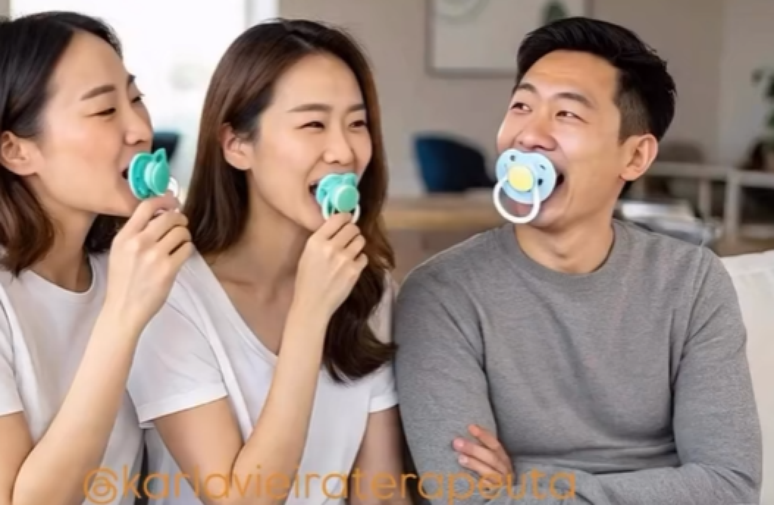The use of the accessory for children is associated with relief from stress and improvement of sleep
A curious habit has gained popularity in China: adults who use pacifiers to control stress. The practice, which promises to redeem the memories of childhood comfort, has been underlined by supporters as a way to relieve anxiety and improve the quality of sleep of those who suffer from insomnia. However, health experts already warn possible physical and psychological risks associated with prolonged use.
“The use of pacifiers by adults can cause numerous physical, psychological and social damage, especially when the intention is to relieve the symptoms of anxiety. This disorder has multiple causes, which combine biological, emotional and environmental factors. These are trauma or brain. Complex conditions that cannot be resolved only with external resources,” says the psychologist Carla Campos.
According to the expert, when the pacifier is used as a strategy to face anxiety, it can generate negative psychological effects, such as behavioral regression. “This habit stimulates children’s behavior and can slow down emotional development, autonomy and ability to face regular frustrations and emotions,” he says.
The psychologist states that while the aspiration and the bite provide immediate relief, acting as a placebo effect, use does not deal with the cause of anxiety and can delay the person’s emotional maturity.
A recommend the pacifiers for “emotionally unstable individuals”
The “pacifiers for adults”, silicone or rubber products, are available on e-commerce platforms for prices that can cost $ 19.90 and exceed $ 400, if customized or initial.
In one of the shopping advertisements, the pacifier is suitable for “stress relief: suitable for” white -collar “workers, emotionally unstable individuals who face pressure under pressure, those who face stress, anxiety, tension and low work”.
In the networks, the relationships speak of the well -being caused by the use of the common object between children. “The pacifier is super comfortable, it doesn’t hurt and has a great way in the mouth,” says a buyer.
“I have anxiety and the pacifier helps me a lot, he calms me and helps me to sleep better. I already use the pacifier has some time, honestly, I am sorry to make use of it before. His beak is comfortable and adapts perfectly in the mouth. A feeling of inexplicable relaxation,” said a customer.
A consumer said that the accessory was useful for dealing with the abstinence of cigarettes, providing “psychological comfort”. There are also those who use the object during working hours, comparing the feeling with the safety of the childhood.
Risks for oral health
From a physical and dental point of view, the damage is also significant. Prolonged use can compromise the bite, cause dental problems, generate muscle tension and increase the risk of infections by the proliferation of bacteria.
“Prolonged aspiration has constant resistance on teeth and dental arches, which can cause unwanted movements, causing misalignment, open bite or crossing. In adults, these problems tend to be even more difficult to correct than children, they often require complex orthodontic treatment.
In addition, the continuous pressure can lead to an overload on the Temporo -Mandibular joints (TMJ), leading to the jaw pain, crackle and even difficulty opening and closing the mouth. “Another point is the accumulation of bacterial plate: if the pacifier is not adequately disinfected, it becomes at the center of microorganisms, increasing the risk of decaying the teeth, gums and delivery errors,” he adds.
There are also functional impacts: the constant presence of the object in the mouth can interfere with the position of language, compromise language and swallowing and contributing to breathing problems, especially if used during sleep. “In short, the habit, even if it seems harmless, can have lasting consequences for teeth, gums and mouth support structures,” concludes the expert.
According to the dental surgeon Diana Fernandes, the impact can be even more worrying in people who have already predisposition to dysfunctions in TMJ or dental misalignment.
“This is a deleterious habit, without evidence of true psychological and potential benefits to cause structural damage. Instead of alleviating stress, it can lead to problems that require complex and prolonged treatments,” says the expert.
Source: Terra
Ben Stock is a lifestyle journalist and author at Gossipify. He writes about topics such as health, wellness, travel, food and home decor. He provides practical advice and inspiration to improve well-being, keeps readers up to date with latest lifestyle news and trends, known for his engaging writing style, in-depth analysis and unique perspectives.








